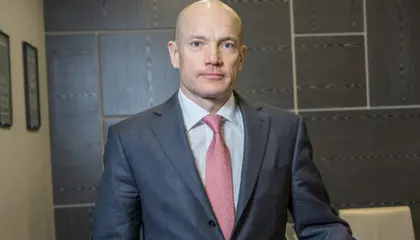In an interview with “Ukrayinska Pravda”, Tomas Fiala, an investment banker and owner of Dragon Capital and the “UP” media outlet, spoke about the state of the Ukrainian budget, commented on the government's economic mistakes and prospects for Ukraine's recovery after the war.
Here Kyiv Post highlights the main aspects of that interview
JOIN US ON TELEGRAM
Follow our coverage of the war on the @Kyivpost_official.
Partners fully finance the budget deficit
From a purely financial point of view, the situation for this year looks good. Partners will provide $ 10 billion, which is sufficient to fully finance the budget deficit in 2023. These funds consist of direct grants from the USA and a 35-year loan from Europe, for which interest is not paid as it is compensated from the EU budget."
An average 50% fall in the value of Ukrainian assets since February 24, 2022
Sovereign bonds are currently trading at 20% of face value, a fall of nearly 80%. Corporate stocks are trading at between 40% and 60% of their nominal value. Tomas Fiala’s view is that, currently, assets are difficult to value. Buyers are unwilling to invest tens or even hundreds of millions of dollars on physical assets in Ukraine, while the war continues and there is a risk they could be destroyed by military action. Even though Kyiv is currently very well protected, very few investors are prepared to take the risk especially for real estate."
Economically Ukraine is not under external control in spite of the huge financial injections

Ukraine’s Sugar Exports to EU Almost Halve Despite Record Production
The provision of grants from the USA that do not to be repaid are saving Ukraine. Loans from the International Monetary Fund (IMF), come with tougher conditions, particularly in the prevention of corruption. The immediate goals are not only for Ukraine to win the war, but to ensure that it does not become a failed state; develops strong institutions, a strong democracy and an advanced economy. This will enable Ukraine to move towards membership of the European Union in the future and to be in a position to reimburse Europe after the 35-years loan period.
Government mistakes in relation to Tax at the beginning of the war
Fiala believes a major mistake by the Government in 2022 was the reductions it made in certain taxes. VAT on imports for FOPS (individual entrepreneurs) was removed and only reintroduced on July 1. This, combined with a fixed exchange rate, resulted in increased imports and penalized domestic producers who still needed to pay VAT on its exports. In addition, lowering VAT and excise duty on petroleum products combined with a reduction in FOP taxes from 5% to 2% acted as a disincentive to work.
Fiala does not understand why more effort was not made to maximize revenues from customs duties and tax, particularly in times of war. He also commented on his belief that, when tax was the main source of finance for the army, so much was lost through corrupt behavior.
The impact of the war on the political process
Fiala feels that the war reduced the ability of parliament to influence politics and the economy. This was combined with the loss of focus by the media on “normal politics”, such as election prospects, and a concentration on output such as the war-related “telethon”. This change in emphasis reduced the ability of both opposition politicians and oligarchs to hold the government to account. He also expressed concern that this shift enabled certain oligarchs and corrupt officials to maintain unhealthy influence undetected and to illegally divert funds from the state. It is essential that there is increased effort to ensure that the courts, law enforcement agencies, anti-corruption bodies, SAPO, NABU become more effective in identifying and dealing with all aspects of corruption.
Need to nationalize Russian assets
Fiala identifies what he sees as a lack of political will to accelerate the rate at which Russian assets within Ukraine are being identified and nationalized. He believes that this is allowing Russian owners to transfer ownership to others, which he sees as another form of corruption. There should be more effort made into putting these assets under Ukrainian control either by a change in management or by outright nationalization and for the state to directly benefit from this.
You can also highlight the text and press Ctrl + Enter










